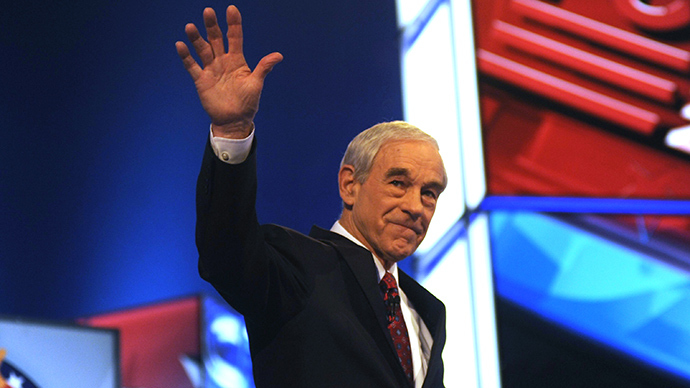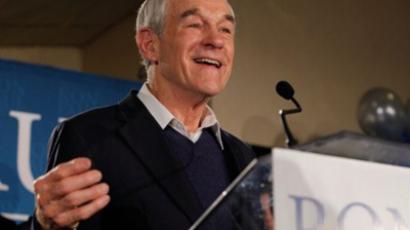Ron Paul: Imperial presidency, abuse of presidential powers have grown since Nixon

In his weekly column, Dr. Ron Paul blasted the Obama and George W. Bush administrations for taking the ‘imperial presidency’ ‒ which was supposed to end after President Richard Nixon resigned ‒ far further than the disgraced politician ever did.
The former Republican congressman from Texas took the two most recent presidential administrations to task for abusing their power, and compared them to the actions Nixon took that forced him out of office before Congress impeached him. Paul, a three-time presidential candidate, focused his 'Nixon Vindicated' op-ed on the use of the Internal Revenue Service (IRS), spying and the warfare state.
The renowned libertarian first analyzed Nixon’s IRS scandal versus the current one that the Obama administration faces. In May 2013, the US tax agency confessed it had targeted conservative political groups, putting them under extra scrutiny during the months leading up to the 2012 presidential election. Nixon had used the IRS to persecute his political opponents, which was a subject of the articles of impeachment against him.
“As bad as Nixon’s abuse of the IRS was, he was hardly the first president to use the IRS this way, and the present administration seems to be continuing this tradition,” Paul wrote, adding that, under President Barack Obama, the agency had targeted one of his organizations, Campaign for Liberty. The IRS “demanded” the non-profit “hand over information regarding its major donors.”
Repealing Nixon's Legacy - Check out this week's column on the imperial presidency @VoLibertyhttp://t.co/QCDTwvBr8R
— Ron Paul (@RonPaul) September 7, 2014
The main focus of Nixon’s downfall was the Watergate scandal. On June 17, 1972, burglars broke into the Democratic Party’s National Committee offices in the Watergate complex in Washington, DC. The burglary and subsequent cover-up were eventually tied to the president, who won reelection later in 1972. By 1974, Congress had moved to impeach Nixon, who resigned on August 8, 1974.
“Watergate is now an all-encompassing term used to refer to: political burglary, bribery, extortion, phonetapping, conspiracy, obstruction of justice, destruction of evidence, tax fraud, illegal use of government agencies such as the CIA and the FBI, illegal campaign contributions and use of public money for private purposes,”watergate.info wrote. “Most of all, Watergate is synonymous with abuse of power.”
To Paul, Watergate is minor when contrasted with the actions of those who have followed Nixon in the White House.
“Nixon’s abuse of federal power to spy on his ‘enemies’ was abhorrent, but Nixon’s abuses of civil liberties pale in comparison to those of his successors. Today literally anyone in the world can be spied on, indefinitely detained, or placed on a presidential ‘kill list’ based on nothing more than a presidential order,” Paul wrote. “For all his faults, Nixon never tried to claim the power to unilaterally order anyone in the world detained or killed.”
The libertarian blamed entrenched partisan politics for the advancement of the imperial presidency, erosion of civil liberties and constant warmongering by today’s politicians. “[M]any politicians place partisan concerns above loyalty to the Constitution. Thus, they openly defend, and even celebrate, executive branch power grabs when made by a president of their own party.”
The 11-term former congressman has long railed against an interventionist foreign policy. Most recently, Paul told RT in August that the United States need only look to the history books for advice on how to handle the escalating crisis in Iraq, and pull the American military out of the country immediately.
He continued that school of thought in this week’s column.
“Many politicians and intellectuals in both parties support an imperial presidency because they recognize that the Founders’ vision of a limited executive branch is incompatible with an aggressive foreign policy. When Republicans are in power ‘neoconservatives’ take the lead, while when Democrats are in power ‘humanitarian interventionists’ take the lead,” he wrote. “Regardless of party or ideological label, they share the same goal — to protect the executive branch from being constrained by the constitutional requirement that the president seek congressional approval before waging war.”
Paul looked at how Congress failed to add Nixon’s May 1969 top-secret campaign in Cambodia to the list of sins for which they wished to impeach the president. The bombing and subsequent invasion of Vietnam’s neighbor was intended to attack suspected communist base camps and supply areas in Cambodia. According to the History Channel, a total of 3,630 flights over Cambodia dropped 110,000 tons of bombs during a 14-month period through April 1970. This bombing of Cambodia and all follow up operations were kept secret from the American public and the US Congress because Cambodia was ostensibly neutral.
“The failure to include the Cambodia invasion in the articles of impeachment may well be the main reason Watergate had little to do with reining in the imperial presidency,” Paul wrote. “Because the imperial presidency is rooted in the war power, attempts to rein in the imperial presidency that do not work to restore Congress’ constitutional authority to declare war are doomed to fail.”
Paul concluded that the US needs a new, bipartisan coalition that values peace and civil liberties over the extension of the warfare state, placing the Constitution above partisan politics. The most important way to achieve that, he stated, is to restore “congressional supremacy in matters of war and peace.”














